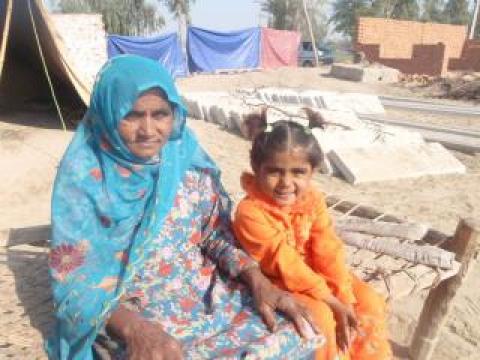Flood-affected communities embrace new hygiene & sanitation practices for healthier lives

Amir Mai took Fizza to a number of doctors but the prescribed medicines didn’t improve her condition because the source of the problem – unclean water – hadn’t changed. Gastroenteritis, allergies and skin diseases such as scabies, were also rife.
Our lives are much changed now we keep our bodies and our clothes clean and children are less frequently ill and adults are doing better as wellAccording to a Knowledge Attitude and Practices (KAP) survey in Muzaffargarh district, 97% of the villagers were openly defecating in the fields around their houses and had little or no awareness on the use of latrines and of the 10,203 surveyed, more than 80% of individuals, mostly women and children, were suffering with diarrhea.
Only when Amir Mai began to use aqua tablets to clean drinking water and adopt different hand washing practices did Fizza’s condition improve. World Vision’s Water, Sanitation and Hygiene programme in the four badly-affected areas of Muzaffargarh district (Muzaffargarh, Kot Adu, Jatoi and Alipur) is helping 15,000 households (53,748 individuals) through the provision of aqua tablets, water coolers and hand washing cubicles. As importantly, people are being trained on how to prepare and use aqua tabs, as well as on the importance of washing hands with soap before eating and using the toilet.
“Aqua tabs and health and hygiene orientation sessions have brought a big change in our lives. I am greatly thankful to World Vision for their support to us- we want World Vision to continue work for our village”, said a happy Amir Mai.
“Never before had we given thought to hygiene at home or to our environment. Our lives are much changed now we keep our bodies and our clothes clean and children are less frequently ill and adults are doing better as well,” said 48-year-old Hazoor Bakhsh, who also remembers how World Vision provided food and non-food-items like kitchen sets and mosquito nets, etc, after the floods.
Children like 14-year-old Mohammad Irfan, an eighth grader, have also taken the hygiene and sanitation messages seriously and are spreading the word about using latrines and hand washing. “Now you won’t find any open defecation in the vicinity of our village up to 300 metres”, he says.
Further south, 35km from Bherri Walla in Dhudi Walla, residents Shamim Akhtar and Kosar Mai were inspired by training on health and hygiene to not only construct their own latrines using their own resources but also organise clean-up campaigns in their village to motivate others to construct latrines.
We have gained a lot of confidence and courage to fight with future hardships and diseasesBoth Shamim Mai and Kosar Mai say their living conditions have improved because of the ‘WASH’ activities and messages, including use of latrines and hand washing. “Our health is better now, we use proper washrooms and use soap to clean our hands after using it, collect garbage around our houses and throw it away at designated places. We have gained a lot of confidence and courage to fight with future hardships and diseases. Without World Vision, we couldn\'t have done so", said Shamim Mai.
To date, 525 latrines have been constructed and 10 rural communities have obtained open defecation free (ODF) status from the Tehsil Municipal Administration (TMA).
World Vision Pakistan has assisted 273,000 people (40,000 households) across Pakistan through water, sanitation and hygiene interventions, including construction of latrines, bathing places, washing places, installation of water tanks, hand pumps, distribution of water purification tablets, health and hygiene promotion sessions, distribution of hygiene information material and kits, and the formation of water and sanitation committees. These initiatives all form part of World Vision’s health programme which is striving to ensure all children across Pakistan enjoy good health.
-Ends-